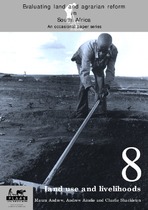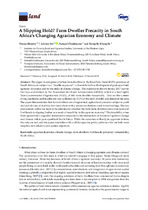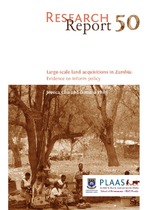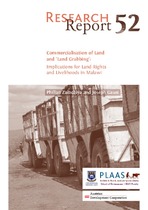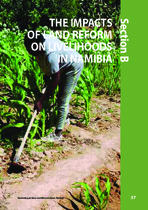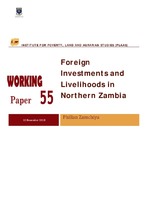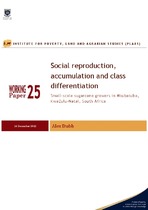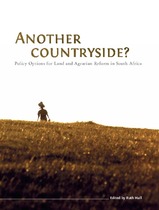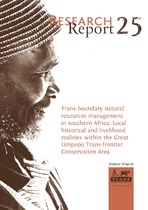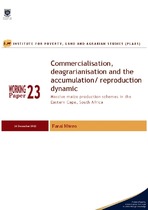Search
Now showing items 11-20 of 48
Evaluating land and agrarian reform in South Africa : Land use and livelihoods
(Institute for Poverty Land and Agrarian Studies (PLAAS), 2003)
This paper addresses how land reform can contribute to enhancing land-based livelihoods.
South African agriculture is often characterised as being divided into two types: freehold
tenure/ commercial agriculture vs. ...
A slipping hold? Farm dweller precarity in South Africa’s changing agrarian economy and climate
(MDPI, 2018)
The paper investigates whether farm dwellers in the KwaZulu-Natal (KZN) province of
South Africa are subject to a “double exposure”: vulnerable both to the impacts of post-apartheid
agrarian dynamics and to the risks of ...
Large-scale land acquisitions in Zambia: Evidence to inform policy
(Institute for Poverty, Land and Agrarian Studies, University of the Western Cape, 2015)
Land in Zambia plays a vital role in sustaining
livelihoods, ensuring food security and reducing
poverty. If people are not able to access
land (including communal interests, such as
lands for grazing or access to water ...
Commercialisation of land and ‘Land Grabbing': Implications for Land Rights and livelihoods in Malawi
(Institute for Poverty, Land and Agrarian Studies, University of the Western Cape, 2015)
This study investigates the processes and
impact of commercialisation of land in Malawi
– specifically the acquisition of huge tracts
of communal lands by foreign companies and
local elites for sugarcane production in ...
Livelihoods after land reform: The impacts of land reform on livelihoods in Namibia: Section B
(Institute for Poverty, Land and Agrarian Studies, University of the Western Cape, 2010)
The first AALS farmers in Hardap obtained their land in 1992, and the most recent in 2003.
In Omaheke, the first AALS farmer obtained his farm in 1992 and the most recent, a woman,
in 2000. Thus in both regions the oldest ...
Foreign investments and livelihoods in northern Zambia
(Institute for Poverty, Land and Agrarian Studies, University of the Western Cape, 2018-12)
This study employs a wider livelihoods approach to challenge some insular neo-classical economic narratives on the nature, process and impact of large-scale land acquisitions on smallholder farmers living on Africa’s ...
Social reproduction, accumulation and class differentiation: Small-scale sugarcane growers in Mtubatuba, KwaZulu-Natal, South Africa
(Institute for Poverty, Land and Agrarian Studies, University of the Western Cape, 2012-12)
This paper argues that the rise and decline of small-scale sugarcane grower (SSG) production in
KwaZulu-Natal must be historically located within a changing structural relationship with
miller-processors, in turn conditioned ...
Another countryside? Policy options for land and agrarian reform in South Africa
(Institute for Poverty Land and Agrarian Studies (PLAAS), 2009)
Land reform in South Africa is a political project that has foundered. For years, the process has been variously described as being ‘in crisis’, ‘at a crossroads’, ‘at an impasse’ or simply ’stuck’. This still seems as ...
Trans-boundary natural resources management in southern Africa: Local historical and livelihood realities within the Great Limpopo Trans-frontier Conservation Area
(Institute for Poverty, Land and Agrarian Studies, University of the Western Cape, 2007)
The end of apartheid rule in South Africa, together with the termination of the civil war in Mozambique and the occupation of Namibia by South Africa in the early 1990s, seemed to herald profound changes in international ...
Commercialisation, deagrarianisation and the accumulation/reproduction dynamic: Massive maize production schemes in the Eastern Cape, South Africa
(Institute for Poverty, Land and Agrarian Studies, University of the Western Cape, 2012-12)
The post-apartheid era has seen the South African government trying to reverse ‘deagrarianisation’
in the former homelands by introducing ‘modern’ farming techniques and agribusiness
principles. This paper situates the ...

